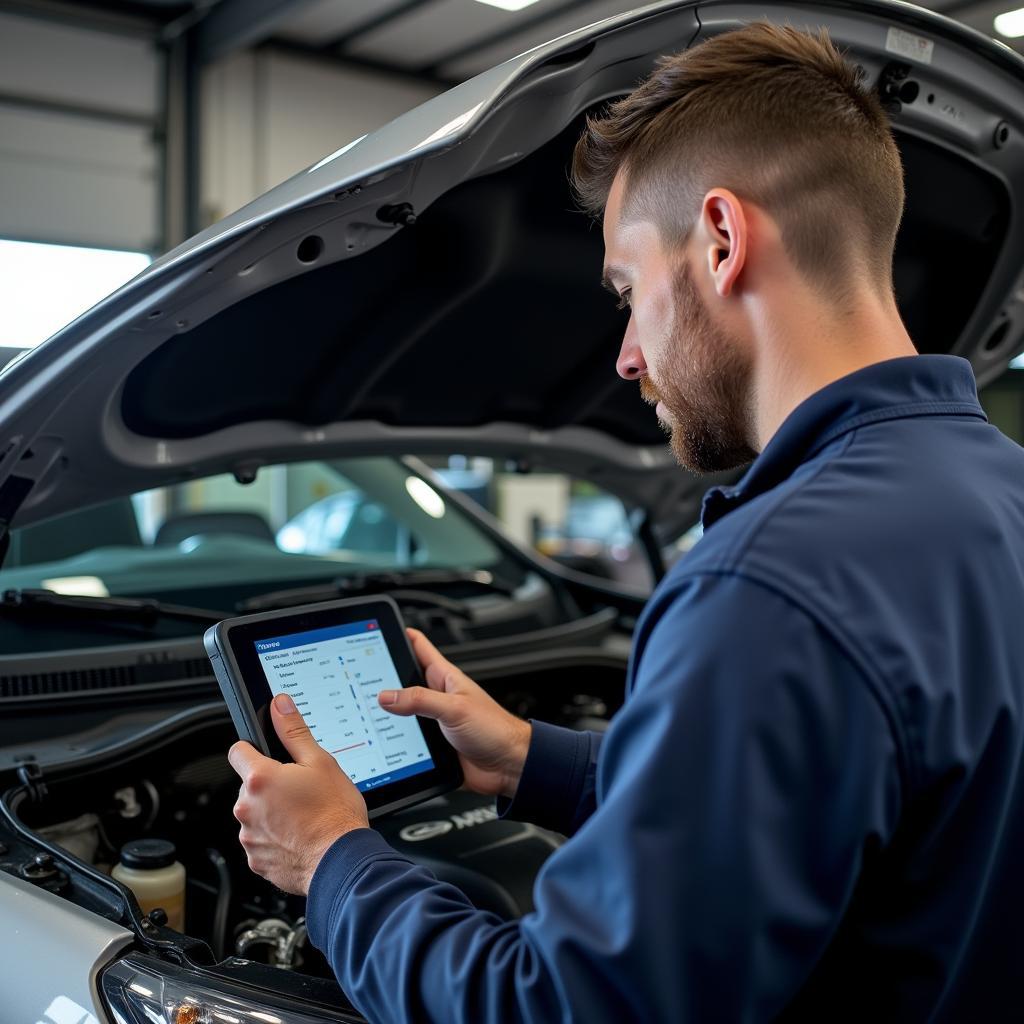Knowing how to check diagnostics on your car is an essential part of modern car ownership. Whether you’re experiencing engine trouble, a blinking dashboard light, or simply want to stay ahead of potential issues, understanding your car’s diagnostic system can save you time, money, and unnecessary headaches.
Understanding Your Car’s Diagnostic System
Modern vehicles come equipped with an onboard diagnostic system, often referred to as OBD or OBD-II. This system acts as your car’s internal computer, constantly monitoring various sensors and components for proper function. When a problem arises, the OBD system stores a diagnostic trouble code (DTC) in its memory, acting as a digital breadcrumb trail leading to the root of the issue.
Methods for Checking Car Diagnostics
There are several ways to check your car’s diagnostics, ranging from simple DIY methods to professional-grade tools:
1. OBD-II Code Reader
An OBD-II code reader is a handheld device that plugs into your car’s OBD-II port, typically located under the dashboard on the driver’s side. These readers, ranging from budget-friendly to feature-rich, can retrieve and display DTCs, providing valuable insight into your car’s health.
Benefits:
- Affordable and widely accessible.
- Easy to use, even for beginners.
- Provides basic information about potential car problems.
2. Mobile Apps
Several mobile apps utilize Bluetooth OBD-II adapters to connect to your car’s diagnostic system. These apps offer a user-friendly interface for viewing and interpreting DTCs, often accompanied by additional features like real-time data monitoring and maintenance reminders.
Benefits:
- Convenient and portable.
- Offers additional features beyond basic code reading.
- Often more affordable than standalone code readers.
3. Professional Diagnostic Scanners
Professional mechanics and experienced DIYers often utilize professional-grade diagnostic scanners. These advanced tools provide comprehensive access to your car’s computer system, allowing for in-depth analysis, live data streaming, and even component activation for testing purposes.
 Professional Diagnostic Scan in a Garage
Professional Diagnostic Scan in a Garage
Benefits:
- Offers the most comprehensive diagnostic capabilities.
- Allows for advanced troubleshooting and analysis.
- Essential for complex repairs and module programming.
What to Do After Checking Diagnostics
Once you’ve retrieved the DTCs from your car, the next step is to understand their meaning and take appropriate action:
- Research the Code: Numerous online resources, including DiagFixPro, offer detailed information about specific DTCs. Understanding the code’s definition and potential causes is crucial for effective troubleshooting.
- Further Inspection: Depending on the DTC and your comfort level with car repair, you can perform further inspection of the affected system or components.
- Seek Professional Help: For complex issues or repairs beyond your expertise, it’s always recommended to seek the assistance of a qualified mechanic.
Common Reasons to Check Car Diagnostics
While a check engine light is a common trigger, there are various scenarios when checking your car’s diagnostics is beneficial:
- Illuminated Warning Lights: Any illuminated warning light on your dashboard, such as the check engine, ABS, or airbag light, indicates a potential issue requiring diagnostic attention.
- Performance Problems: Engine misfires, rough idling, decreased fuel efficiency, or unusual noises can signal underlying problems detectable through diagnostic checks.
- Used Car Purchase: Before purchasing a used car, running a diagnostic check can reveal potential hidden problems and help you make an informed decision.
- Preventative Maintenance: Periodically checking your car’s diagnostics, even without noticeable issues, can help identify minor problems before they escalate into major repairs.
full diagnostic test on car cost
The Importance of Regular Diagnostic Checks
Regularly checking your car’s diagnostics, whether through DIY methods or professional inspections, offers several benefits:
- Early Problem Detection: Identifying and addressing issues early can prevent costly repairs down the line.
- Improved Vehicle Performance: A well-maintained car, free from underlying issues, typically performs better and offers improved fuel efficiency.
- Enhanced Safety: Addressing safety-related DTCs promptly ensures your vehicle operates safely and reliably.
- Increased Resale Value: A well-documented maintenance history, including regular diagnostic checks, can increase your car’s resale value.
same day car diagnostic test near me
Conclusion
Checking diagnostics on your car is no longer a task reserved solely for mechanics. With readily available tools and resources like DiagFixPro, car owners can take a proactive approach to vehicle maintenance, ensuring optimal performance, safety, and longevity. Remember, a little knowledge about your car’s diagnostic system can go a long way in saving you time, money, and potential headaches on the road.

Leave a Reply